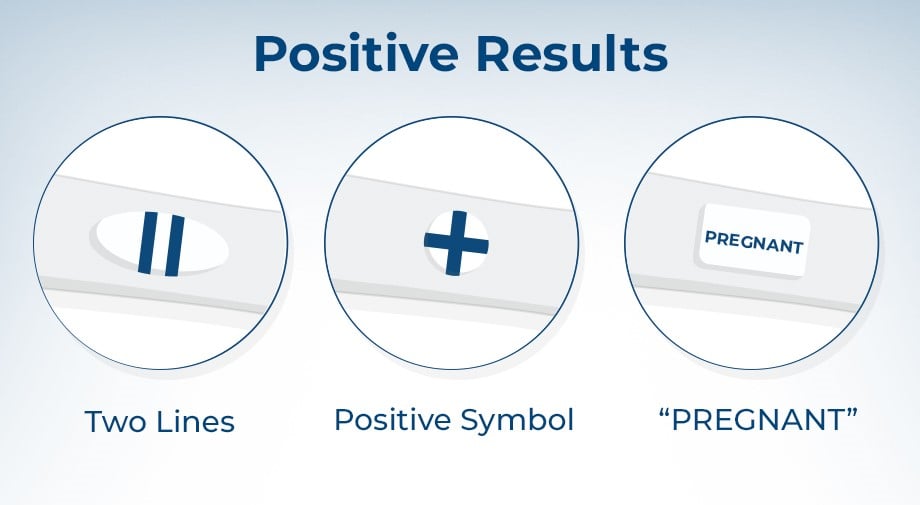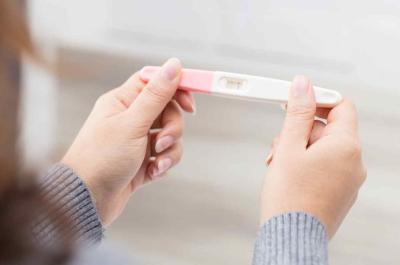I got a positive result, now what? Is the result accurate or not? What should I do next? Feeling overwhelmed when you take a home pregnancy test is perfectly normal, especially if the result comes out positive. As you stare at the stick in your hand, you may feel joy, anxiety, fear, disbelief or a mix of all these emotions, and you’ll have so many questions running through your head. When it comes to understanding what the test means, we can at least help you there. Read on to understand more about your test result, what you should do next and what you need to know about getting a positive pregnancy test result.
- A pregnancy test works by detecting the hCG hormone, which is usually only present in your body if you’re pregnant.
- A positive result—even a faint line—on a pregnancy test means you’re almost certainly pregnant.
- False positive results are incredibly rare, and only happen if you have recently been pregnant, you’re on fertility medications containing hCG, or you have a rare medical condition that causes hCG to be present.
- Whether you want to be pregnant or not, there is a support network out there for you.
What should I do if the test is positive?
Even if you’re trying to conceive, a positive result may send you into a panic about what to do next. It’s normal to think twice about your plans, but just take some time to let the news of the result sink in and take a few breaths. First, don’t worry, whether you wanted to be pregnant or not, there is a support network out there for you.
Book an appointment with a doctor to discuss your pregnancy and antenatal care if you are planning to keep the baby.
If you’re not sure you want a baby, there is help available. A good place to start could be the British Pregnancy Advisory Service (BPAS). Or you can talk to your doctor or a healthcare professional to discuss your options.
Can I be sure my pregnancy test is positive?
Yes. Even a faint line on the stick is a positive result and means you are pregnant. Pregnancy tests pick up on the pregnancy hormone hCG (human Chorionic Gonadotrophin), which your body starts making when you get pregnant. Your body will produce more of this hormone during the early stages of pregnancy, and most home pregnancy tests will give you a 99% accurate result if you test from, or after, the day of your expected period. More sensitive tests, like Clearblue Ultra Early Pregnancy Test will detect the presence of hCG from six days before your missed period (which is five days before you expect your period).
Because hCG is usually only present in your body when you’re pregnant, false positive results are incredibly rare. If you use a reliable pregnancy test, like Clearblue, you can be over 99% certain you’re pregnant if you see a positive result.
However, sometimes reading and understanding the result of a pregnancy test can be a little confusing. Since each test is different, make sure you follow the instructions, but most pregnancy tests give you a positive result with the following:
- Two lines. Most tests will have a control line – this just lets you know the test has worked – which shows up as you’re waiting for the results and if you’re not pregnant, you will only see this line. However, if you’re pregnant, you will see two lines. Even if the second line is very faint, this is still a positive result and means you’re pregnant.
- A plus sign. Some tests may show the results with a plus or minus symbol. A negative symbol, means you’re not pregnant; but if you see another line cross the negative line to form a plus sign, this means you’re pregnant. You will also see another line in the control box which tells you the test worked.
Pregnant. You can also get a digital test that literally spells it out for you with the words ‘Pregnant’ or ‘Not Pregnant’, making it easy to understand the results.

What can cause a false-positive pregnancy test result?
Getting a positive result when you’re not pregnant is incredibly rare, and you can read about false-positive pregnancy test results here. The top three reasons you may get a false positive are:
- You’ve recently been pregnant.
- You’ve been taking fertility medications that contain hCG.
- You have a very rare medical condition, like ovarian cysts, that produce hCG and turn your result positive.
Do I need to confirm my pregnancy test?
You don’t have to take another test if you get a positive result, but many women choose to repeat the test just to be sure. If you do get a positive result, book an appointment with your doctor or midwife.

Am I pregnant (Quiz)?
If you can't buy a pregnancy test right now, try our quick “Am I pregnant?” quiz to see if your symptoms might be an early clue.





